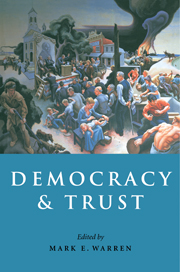Book contents
- Frontmatter
- Contents
- List of figures
- List of tables
- List of contributors
- Acknowledgments
- 1 Introduction
- 2 Do we want trust in government?
- 3 How can we trust our fellow citizens?
- 4 Trust, well-being and democracy
- 5 Democracy and social capital
- 6 Liberty against the democratic state: on the historical and contemporary sources of American distrust
- 7 Trust, voluntary association and workable democracy: the contemporary American discourse of civil society
- 8 Trust and its surrogates: psychological foundations of political process
- 9 Geographies of trust, geographies of hierarchy
- 10 Altruistic trust
- 11 Democratic theory and trust
- 12 Conclusion
- Index
12 - Conclusion
Published online by Cambridge University Press: 15 March 2010
- Frontmatter
- Contents
- List of figures
- List of tables
- List of contributors
- Acknowledgments
- 1 Introduction
- 2 Do we want trust in government?
- 3 How can we trust our fellow citizens?
- 4 Trust, well-being and democracy
- 5 Democracy and social capital
- 6 Liberty against the democratic state: on the historical and contemporary sources of American distrust
- 7 Trust, voluntary association and workable democracy: the contemporary American discourse of civil society
- 8 Trust and its surrogates: psychological foundations of political process
- 9 Geographies of trust, geographies of hierarchy
- 10 Altruistic trust
- 11 Democratic theory and trust
- 12 Conclusion
- Index
Summary
The problem of establishing a good form of collective rule, Rousseau explained in The Social Contract, “is to find a form of association which will defend and protect with the whole common force the person and goods of each associate, and in which each, while uniting himself with all, may obey himself alone, and remain as free as before” (1913: Book I, chap. VI). In many ways Rousseau's problem in The Social Contract remains ours. But his solution – that individuals might develop and complete their human capacities through identifying with the General Will – has not worn as well as the problem. In designing political procedures that would evoke the General Will, Rousseau supposed a social homogeneity and structural simplicity rare even in his day, while implicitly seeking a unified form of community that is no longer possible, even were if it desirable. Yet Rousseau was not entirely misdirected: he designed the social contract for a society of egoists, one in which empathetic solidarity had little force. The Social Contract experimented with the question as to whether new forms of cooperation – the life-blood of society – might be induced by political design, but in ways that would enhance the flourishing of individuals by inducing transformations within society, culture, and identity.
But although this ideal cannot but remain with us, it can go wrong even without the fiction of the General Will. Politics – with the powers it evokes, the conflicts it occasions, and strategic maneuvering it incites – rarely provides a genial environment for such developmental effects.
- Type
- Chapter
- Information
- Democracy and Trust , pp. 346 - 360Publisher: Cambridge University PressPrint publication year: 1999
- 17
- Cited by



